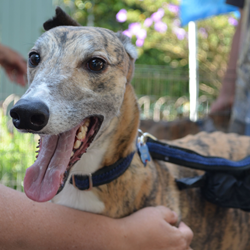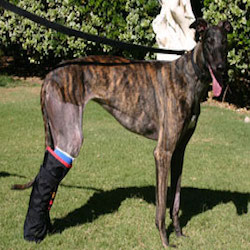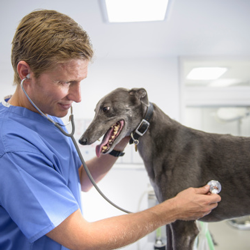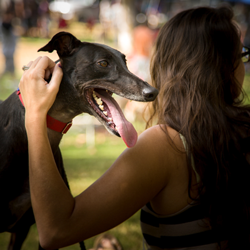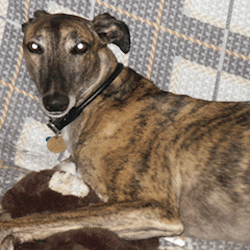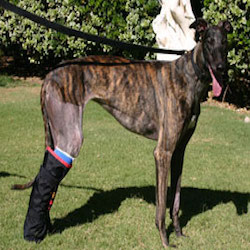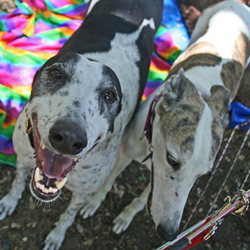GREYHOUND ARE DIFFERENT
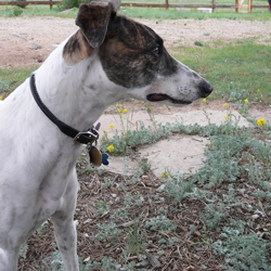
Skin Issues (Rashes, Scratching & Foxtails)
Because Greyhounds have thin skin and little fur to cover it, a small itch can quickly turn into a major wound. It’s important to act immediately. Here are some things that may cause itching, but if you can’t quickly determine the cause, see your veterinarian right away.
• Fleas or ticks – Fleas and ticks can be brought into your yard by stray cats, birds, mice, squirrels, etc. Most dog owners take advantage of one of the many flea and tick treatments now available.
• Due to the sensitivity of Greyhounds to toxins, NEVER USE A FLEA COLLAR.
• Use flea shampoos only if they are marked, “Safe for Puppies.”
• Frontline, Advantage, Program, or Revolution are all generally safe for Greyhounds.
Click here for a comparison of the various products
Remember that you must also treat the environment: Wash the dog beds and thoroughly vacuum the carpet. Then continue to vacuum the carpet and all dog sleeping areas every day for about three weeks to get rid of all of the unhatched flea eggs.
• Dry skin – Medicated shampoos and conditioners on the coat and fish oil in the food can help improve dry skin. Daily brushing with a hound glove can also help disburse the oils. Read the article below for more ideas.
• Shampoo – If your dog begins to scratch shortly after having a bath, he may be reacting to the shampoo or he may not have been rinsed thoroughly. It is sometimes difficult to rinse all of the shampoo from the armpits, between the toes, etc. Try rinsing the dog again.
• Food allergy – These are sometimes difficult to narrow down. Work with your vet if you suspect a food allergy. Sometimes changing to a single-protein food, a no-grain food, or a new protein-based food will help.
• Environmental allergy – Seasonal pollens, fertilizers on lawns, and household cleaning chemicals are just a few of the triggers of environmental allergies. Again, work with your vet, and watch your dog closely to try to determine the onset of the allergy.
• Foxtails – See the section on Foxtails.
Sometimes skin problems are more serious. Here’s a great article by a foster family that has helped several foster dogs with serious skin issues.
• Read “Itchy Skin and Drippy Noses”
Because Greyhounds have thin skin and little fur to cover it, a small itch can quickly turn into a major wound. It’s important to act immediately. Here are some things that may cause itching, but if you can’t quickly determine the cause, see your veterinarian right away.
• Fleas or ticks – Fleas and ticks can be brought into your yard by stray cats, birds, mice, squirrels, etc. Most dog owners take advantage of one of the many flea and tick treatments now available.
• Due to the sensitivity of Greyhounds to toxins, NEVER USE A FLEA COLLAR.
• Use flea shampoos only if they are marked, “Safe for Puppies.”
• Frontline, Advantage, Program, or Revolution are all generally safe for Greyhounds.
Click here for a comparison of the various products
Remember that you must also treat the environment: Wash the dog beds and thoroughly vacuum the carpet. Then continue to vacuum the carpet and all dog sleeping areas every day for about three weeks to get rid of all of the unhatched flea eggs.
• Dry skin – Medicated shampoos and conditioners on the coat and fish oil in the food can help improve dry skin. Daily brushing with a hound glove can also help disburse the oils. Read the article below for more ideas.
• Shampoo – If your dog begins to scratch shortly after having a bath, he may be reacting to the shampoo or he may not have been rinsed thoroughly. It is sometimes difficult to rinse all of the shampoo from the armpits, between the toes, etc. Try rinsing the dog again.
• Food allergy – These are sometimes difficult to narrow down. Work with your vet if you suspect a food allergy. Sometimes changing to a single-protein food, a no-grain food, or a new protein-based food will help.
• Environmental allergy – Seasonal pollens, fertilizers on lawns, and household cleaning chemicals are just a few of the triggers of environmental allergies. Again, work with your vet, and watch your dog closely to try to determine the onset of the allergy.
• Foxtails – See the section on Foxtails.
Sometimes skin problems are more serious. Here’s a great article by a foster family that has helped several foster dogs with serious skin issues.
• Read “Itchy Skin and Drippy Noses”
